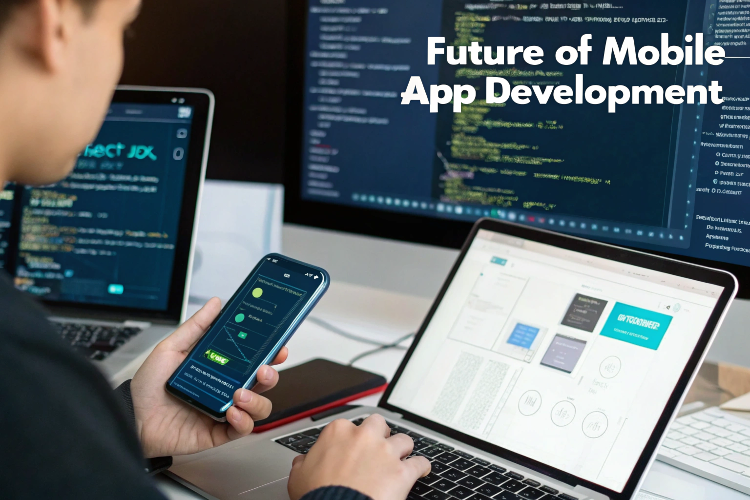Blog
The Future of Mobile App Development: Trends to Watch in 2025
Mobile App Development ▪ 2025-03-07

Mobile app development is evolving at an unprecedented pace, driven by advancements in technology and changing user expectations. As we enter 2025, businesses and developers must stay ahead of the curve by embracing emerging trends that will shape the future of mobile applications. From artificial intelligence (AI) integration to enhanced security measures, the landscape of mobile app development is set to undergo significant transformations.
1. Artificial Intelligence & Machine Learning Integration
AI and machine learning (ML) are playing a crucial role in mobile app development, offering personalized user experiences, predictive analytics, and automation. AI-driven chatbots, voice recognition, and real-time data analysis are becoming standard features in modern applications. In 2025, we can expect more AI-powered tools to enhance app functionalities, such as:
-
Smart recommendation engines
-
Automated customer service through chatbots
-
Advanced speech and image recognition
-
Predictive analytics for personalized content
2. 5G Technology & Its Impact
The widespread adoption of 5G networks is set to revolutionize mobile applications by significantly increasing speed, reducing latency, and enhancing connectivity. With 5G, developers can create more immersive experiences that were previously impossible due to bandwidth limitations. The benefits of 5G in mobile app development include:
-
Faster app performance and smoother user experience
-
Improved streaming quality for video and gaming apps
-
Real-time processing for AR and VR applications
-
Enhanced IoT connectivity and responsiveness
3. Augmented Reality (AR) & Virtual Reality (VR)
AR and VR are no longer limited to gaming and entertainment. Industries such as healthcare, real estate, education, and e-commerce are integrating AR/VR technologies to enhance user engagement. In 2025, mobile apps will leverage AR/VR for:
-
Virtual shopping experiences with try-before-you-buy features
-
Interactive learning and training modules
-
Real-time navigation and location-based services
-
Enhanced gaming experiences with immersive environments
4. Blockchain for Enhanced Security
With increasing concerns over data privacy and security, blockchain technology is emerging as a game-changer in mobile app development. Blockchain ensures transparency, security, and decentralized data storage, making it ideal for:
-
Secure financial transactions and mobile payments
-
Data encryption and user authentication
-
Decentralized applications (dApps) with increased security
-
Supply chain management and digital identity verification
5. Internet of Things (IoT) Integration
The IoT ecosystem is expanding rapidly, enabling mobile apps to interact with smart devices seamlessly. From home automation to healthcare, IoT-powered applications will enhance user convenience and efficiency. Key IoT-driven applications in 2025 include:
-
Smart home automation apps for controlling appliances
-
Wearable technology for health and fitness tracking
-
Connected vehicles with real-time diagnostics and navigation
-
Industrial IoT for predictive maintenance and efficiency monitoring
6. Progressive Web Apps (PWAs)
Progressive Web Apps (PWAs) are gaining popularity due to their ability to offer a seamless user experience across multiple devices without requiring installation. PWAs provide:
-
Faster loading speeds and reduced data consumption
-
Offline access and push notifications
-
Improved SEO performance for businesses
-
Enhanced security with HTTPS encryption
7. Voice Search & Conversational UI
Voice search and conversational user interfaces (UI) are transforming the way users interact with mobile applications. AI-powered voice assistants like Siri, Google Assistant, and Alexa are becoming more sophisticated, allowing users to perform tasks using natural language commands. By 2025, mobile apps will incorporate:
-
Voice-enabled search for faster navigation
-
AI-driven voice assistants for hands-free interactions
-
Multilingual support for global accessibility
-
Integration with smart home and IoT devices
8. Cloud-Based Mobile Apps
Cloud computing is streamlining mobile app development by reducing dependency on device storage and enabling real-time data synchronization. Cloud-based mobile apps offer:
-
Scalability and flexibility for businesses
-
Faster app deployment and updates
-
Improved data security with cloud encryption
-
Seamless collaboration and remote access
9. Low-Code & No-Code Development Platforms
With the increasing demand for mobile applications, low-code and no-code platforms are empowering businesses and individuals to build apps without extensive coding knowledge. These platforms provide:
-
Drag-and-drop interfaces for easy app development
-
Faster prototyping and deployment
-
Reduced development costs and time-to-market
-
Customizable templates and integrations
10. Sustainability & Green App Development
As environmental concerns grow, developers are focusing on creating energy-efficient and sustainable mobile applications. Green app development involves:
-
Optimizing app performance to reduce battery consumption
-
Implementing dark mode for energy savings
-
Utilizing efficient coding practices to minimize resource usage
-
Encouraging eco-friendly user behaviors through gamification

